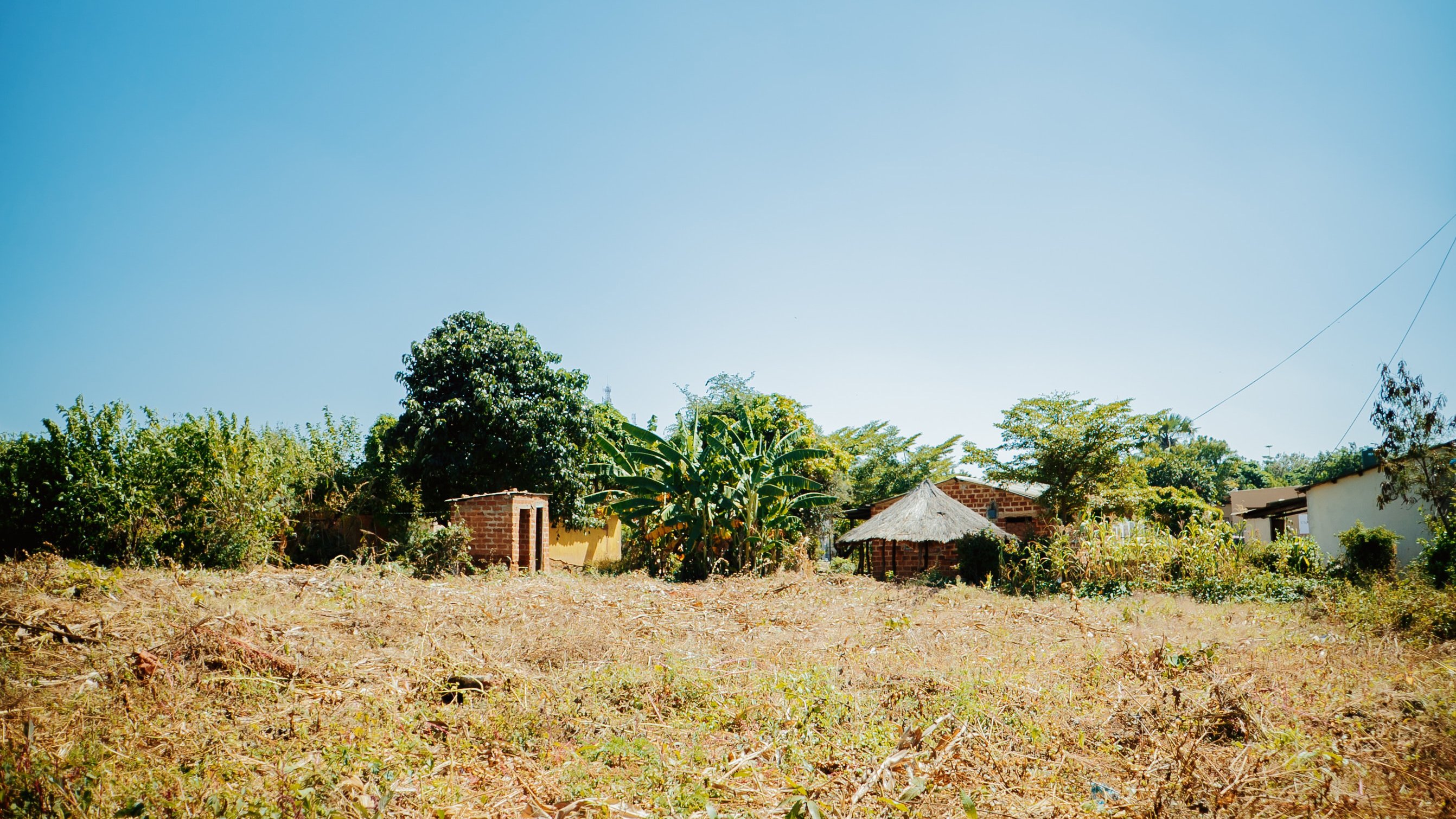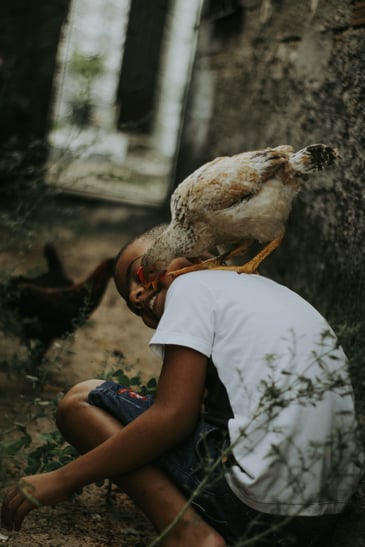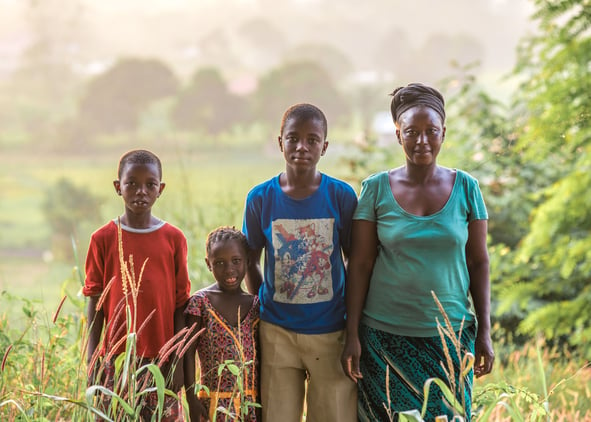.jpg)
Welcome Home: Finding the Way Back to Family
The Journey:
The car lurched sideways as our driver worked to avoid the deep ruts in the dirt lane – a nearly impossible task in the rurals of western Kenya. I sat in the front of the car and glanced periodically at the boy sitting in the back seat, trying not to be obvious. I was curious about what he was thinking and feeling. Next to him was a social worker, Chloe*, from one of our partner organizations. The boy, whose name was Marcus*, was around 10 years old, close in age to both my boys (9 & 11).
As we bumped down the road, I noticed he kept looking out the window, leaning forward as we got closer to our destination. I couldn’t tell if Marcus felt excited, nervous, or something else entirely. His face was calm, his big almond eyes inquisitive, and his body language alert.
No one spoke as the lane narrowed and trees and foliage crept in closer to the edges and brushed across the top and sides of the car. We had left the main road a little earlier and with each minute the dirt lane became less of a road and more of a suggestion of a path barely wide enough for a vehicle.
I glanced at Marcus again, this time, his face was pressed gently against the glass. Not in the silly squished-up nose sort of way, but almost as if he was resting his head on the window. He seemed curious and peaceful. I wondered what my son would be thinking about if one of them were in Marcus’ place. Would he be calm on the outside, like Marcus, or would he be bouncing around in the car like I’d seen him do a thousand times when he was coming to the end of a long journey?

You see, Marcus was going home that afternoon. Home to his family, home to reunite with his mom and siblings whom he’d been separated from for months. I didn’t know his story, but I knew he’d been found on the streets of Kisumu over an hour drive from his home and village, and a distance that must have taken days on foot – a trek that I’d later find out he’d taken with a group of other like-minded boys.
Eventually, the driver pulled up outside a small mud house and stopped. Surrounded by forest and tall brush, neighboring homes were hidden behind the thick leaves and grasses. A group of kids walking up the lane stopped to stare when they saw us. The car alone was obviously a rare sight on this lane, but when I and my coworker, Rhonda, stepped out of the car, the sight of two white women was enough to get the kids chattering and pointing, and I heard more than one exclamation of “Mzungu!” (white foreigner).
The Welcome:
Chloe, a tall muscular woman with long braids and a no-nonsense attitude, led the way up the short path to the house. Marcus trailed just behind her. Standing outside was a slightly older boy, waiting with a big smile on his face. He raised a hand to offer Chloe a fist bump, clearly familiar with her, then reached out to put a brotherly arm around Marcus’ neck. Both boys smiled and shared a brief hug, greeting each other in Swahili.
They turned and followed Chloe through the low door into the house. I hesitated briefly behind Rhonda, unsure of the etiquette, but walked through into a living space after Chloe turned back to gesture us inside. Small couches lined 3 walls of the room, lit only by the light coming in through the front door. It was cool, a relief from the outside heat, and we all sat down at Chloe’s suggestion. A moment later, a petite woman with warm chocolate skin and short hair entered from the interior door at the back of the room. We immediately stood back up to greet her, and she was introduced as Marcus’ Mom. A relationship clarifier, but also a title. Other smaller children entered the room and some identified as younger siblings, others as neighbor kids. Marcus’ Mom spoke to Chloe in Swahili. In fact, the entire conversation was in Swahili, with only a few pauses when Chloe translated for Rhonda and me.

Rhonda and I sat back down on the couch against the exterior wall next to the front door. Chloe and Marcus’ Mom sat on the couch to our left and Marcus’ sat alone on a couch directly across from them, to our right. The older boy, introduced as his older brother, Harrison*, sat near the back of the room across from us. Low tables and crates filled the space between the couches and as the conversation between the family and Chloe continued, various small children filtered in and out of the room, most going to Marcus to whisper or giggle in his ear. Small smiles lit up his face with each interaction, and a warm peace filled the room as the family relaxed into the conversation.
Once or twice a chicken wandered through the open door and hopped up on a table only to be gently shooed away.
The Reunion:
As I sat there, listening and watching, I was struck by the question of how I would feel if one of my sons had been separated from me for an extended period of time. I imagined I would be crying tears of joy and relief and would be wrapping my arms tightly around my returned son, unwilling to let go. I learned that reunions like this are different in Kenya than how I imagined from my Western perspective, although no less meaningful. Marcus’ Mom engaged in conversation with Chloe, speaking softly and nodding in agreement periodically to something Chloe said who would also address Marcus every few minutes. He would reply or nod his head in acknowledgment. I was curious to learn more about this difference between our cultures and made a mental note to ask about it later.
At one point, Chloe shared that Marcus had run away because of some issues at school, and had been unwilling to come home for a while — ashamed of what that would mean for his family. As Chloe and her colleagues worked with Marcus and his mom, they had been able to help rebuild trust and tools to help him feel comfortable enough to return home and to school.
“Marcus asked for forgiveness, and his mom accepted his apology and is welcoming him home.” Chloe translated for us.
She sat with a Bible open on her lap and had been sharing scripture with Marcus and his family. The scripture was about joy and gratitude, but in many ways, this homecoming reminded me of the story of the Prodigal Son where a son leaves home, and after experiencing the harsh reality of the world, is reminded of the love and care of his parent and returns home to be welcomed and forgiven. (Luke 15)
The Home:
The house was humble, well-cared for, and full of life yet still completely different from anything we’d understand in the United States. The home Marcus was returning to had no running water or electricity, and there likely wasn’t a stove, but as we sat there I thought about something I had heard the day before on a visit with another partner — a challenge to take off my Western lens and pay attention not to what was “missing” but what was there. Marcus’ family home had a solid roof and walls, comfortable seating - enough for family and guests, and behind the home was a small garden with vegetables. And of course, the chickens.
What our Western eyes might see and want to fix wasn’t what this family needed. In fact, Marcus hadn’t been separated from his family because of poverty and it wasn’t even really about what happened at school. He had been separated from his family and run away from home, because of a break in relationship. And in order for him to return, the relationship had to be restored. Marcus and his mom both had to trust each other again and rebuild their connection.
As the conversation closed and the necessary paperwork filled out, we stood to offer our farewell and stepped out into the warm afternoon sun. A few shuffles around, and I found myself bent slightly over under the edge of the roof next to the door. Marcus stood in front of me with small siblings surrounding him. His mom and Rhonda gathered on each side of me as Chloe took photos of us to mark the occasion. — A boy returned home to his family, welcomed and forgiven. Not how I would have imagined, but still with warmth and love and purpose.

Later, I asked Rhonda my question about the difference between how I imagined homecoming to look and the reality of what I witnessed. She kindly shared that reunification for families in Kenya carries deep cultural significance for the child and family.
The “success” she said, was in Marcus’ Mom receiving him home — their relationship restored.
And this reminded me of something important I’ve learned over my years in ministry working with vulnerable people — the journeys people take aren’t one size fits all, nor does healing look the same for everyone.
Healing for Marcus and his family looked different than how it would look for me and mine if we found ourselves in a similar situation, and in fact, it would look different for another Kenyan family, because each story and person is unique.
In this work to reunite 1 million children home to safe, loving families, I’m learning that the family separation crisis isn’t caused by one single or “greatest” factor, such as poverty, but is a mix of social, economic, physical, emotional and cultural vulnerabilities that lead to separation. Restoration occurs when the relationships that are broken because of those vulnerabilities are healed and strengthened, just like for Marcus and his Mom.
.......................
*Names and some details omitted or changed to protect the privacy of the individuals and family.

ABOUT THE AUTHOR
Nichole uses stories to mobilize support for the transformational care of vulnerable people. She has 10+ years of advertising experience, specializing in brand development, executive communications, and strategic planning for national and global B2B and B2C brands.
Before joining 1MILLIONHOME, Nichole led development communications for an anti-human trafficking organization and leveraged ethical storytelling to drive growth. She also is an artist and creates spaces for individuals to use creativity for healing. In her role, she works to change mindsets about orphan care and see more kids return home safely.
